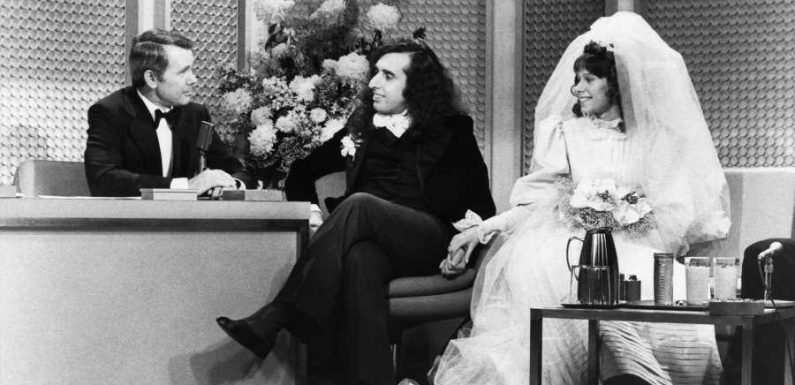
No matter the topic, the finest docs make you realize how much we needed a film on a particular subject. And that rule couldn’t apply more to Tiny Tim: King for a Day, director Johan von Sydow’s overview of the otherworldly life and times of one of the most WTF pop celebrities of the last century. (It hits theaters on April 30th.)
For those who vaguely recall Tiny Tim, or never heard of him at all, the man born Herbert Butros Khaury was the oddest of ducks even during the Sixties, when everybody was letting their freak flags fly. Tall and portly, with a protruding nose and hair that looked like a damp mop falling over his face, Tiny didn’t look like any of the tune-in-and-turn-on musicians and earnest folkies who also emerged from the New York club scene. (Even his wardrobe bucked the times: He tended to wear suits.) He also distinguished himself musically: At a time of protest songs, amped-up folk-rock, and psychedelia, here was a guy strumming a ukulele and warbling, in a falsetto that sounded like a lovestruck bird, pre-rock standards like “Tiptoe Through the Tulips.” From his look to his borderline-leer smile, he was sweet and creepy at the same time.
But as King for a Day documents — in the most detail yet, aside from Justin Martell’s 2016 bio Eternal Troubadour — Tiny Tim became the least likely household name of his day. In seemingly no time at all, he went from being pelted with garbage while singing on New York streets to hanging out with Bob Dylan in Woodstock (we see a quick clip of them together, for a planned D.A. Pennebaker movie that never materialized), guest-starring on variety and talk shows (especially the massive Laugh-In), and scoring a top 10 album. He was even booked at the 1970 Isle of Wight festival, where fans, either stunned or stoned, cheered as he warbled the British patriotic tune “There’ll Always Be an England,” complete with a megaphone.
As the Band (who, as the Hawks, backed him on a few tracks on the soundtrack of the oddball 1967 doc You Are What You Eat) once sang, life is a carnival. And it truly was with Tiny Tim. In 1969, he and his then 17-year-old girlfriend, Miss Vicki (Vicki Budinger), were married on Johnny Carson’s Tonight Show, where Tiny had been a recurring guest. As we hear Carson announce during one of Tiny’s later appearances, the wedding was the highest-rated TV event of its time next to the moon landing. The proto-reality-star aspect only swelled over time: When Tim later talked publicly about his divorce from Vicki, he’s turned his life into a real-life soap opera.
During his heyday, Tim was a proud outsider and even something of a queer icon, and King for a Day makes a claim for him as a forerunner to androgynous pop stars ranging from glam rockers to Boy George. In the way he transformed from schlumpy guy to makeup-plastered carny entertainer [let’s tweak either the pop star above or the pop star here to avoid rep], he definitely seems to have paved the way for Alice Cooper. But as King for a Day relates, he was also proudly heterosexual (and fond of groupies and a degree of kink, which tormented him).
Neither smirky or patronizing, King for a Day uses archival footage, intermittent animation and interviews with friends, fellow entertainers and the last of Tiny’s three spouses to flesh out his back story. Not surprisingly, Tiny grew up feeling lonely, freakish and sexually conflicted. But we also learn he was the child of a Lebanese father and Jewish mother, and his father in particular didn’t seem to know what to make of his son (especially when he finds one of his male friends in the same bed, even if they weren’t having sex). When Tiny gains enough confidence to start singing in public, he’s heckled, and one of his first gigs is being part of a freak show in New York’s Times Square, where he sings near a bearded woman and other human oddities. But when he’s suddenly (and, he claims, divinely) inspired to sing in a trilly falsetto like Bing Crosby on helium, stardom and fame come calling
Tiny’s humbling last few years are the stuff of docs past, present and future. By the dawn of the Eighties, he was on a permanent comeback trail, which included trying to go country, appearing in the campy 1987 horror movie Blood Harvest and remaking “Tiptoe Through the Tulips” with a punk band. Some of the most poignant clips in King for a Day document the period when he was performing in a traveling circus, as if his life had gone full circle back to the freak-show days. And judging by letters and diaries (read by “Weird Al” Yankovic), Tiny, who was reportedly more serious than his public persona let on, knew all too well that that had happened.
But give Tiny Tim this: He died loving what he did. In 1996, he suffered a heart attack during a performance in Minneapolis, just as it seemed as if he was on the verge of some sort of kitschy rediscovery. It’s hard to say whether that comeback would have ever happened. His singing voice and records remain the definition of acquired taste, and King for a Day won’t necessarily send you back to his songs the way other first-rate music docs can. But watching it, you feel glad that such a genuine oddball lived his particular dream and never revealed any public bitterness over the arc of his life. His legacy, it turns out, was the last thing from tiny.
Source: Read Full Article